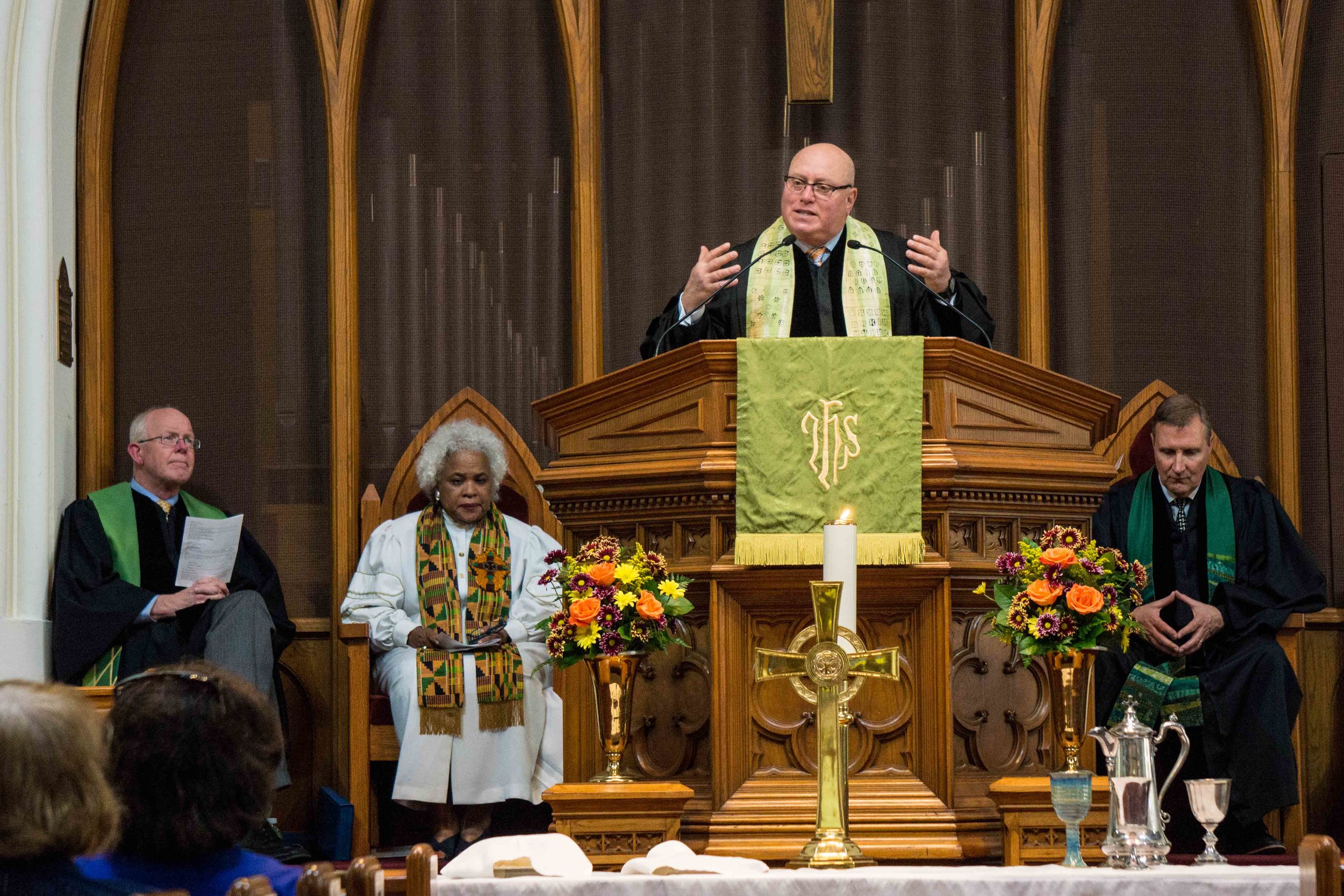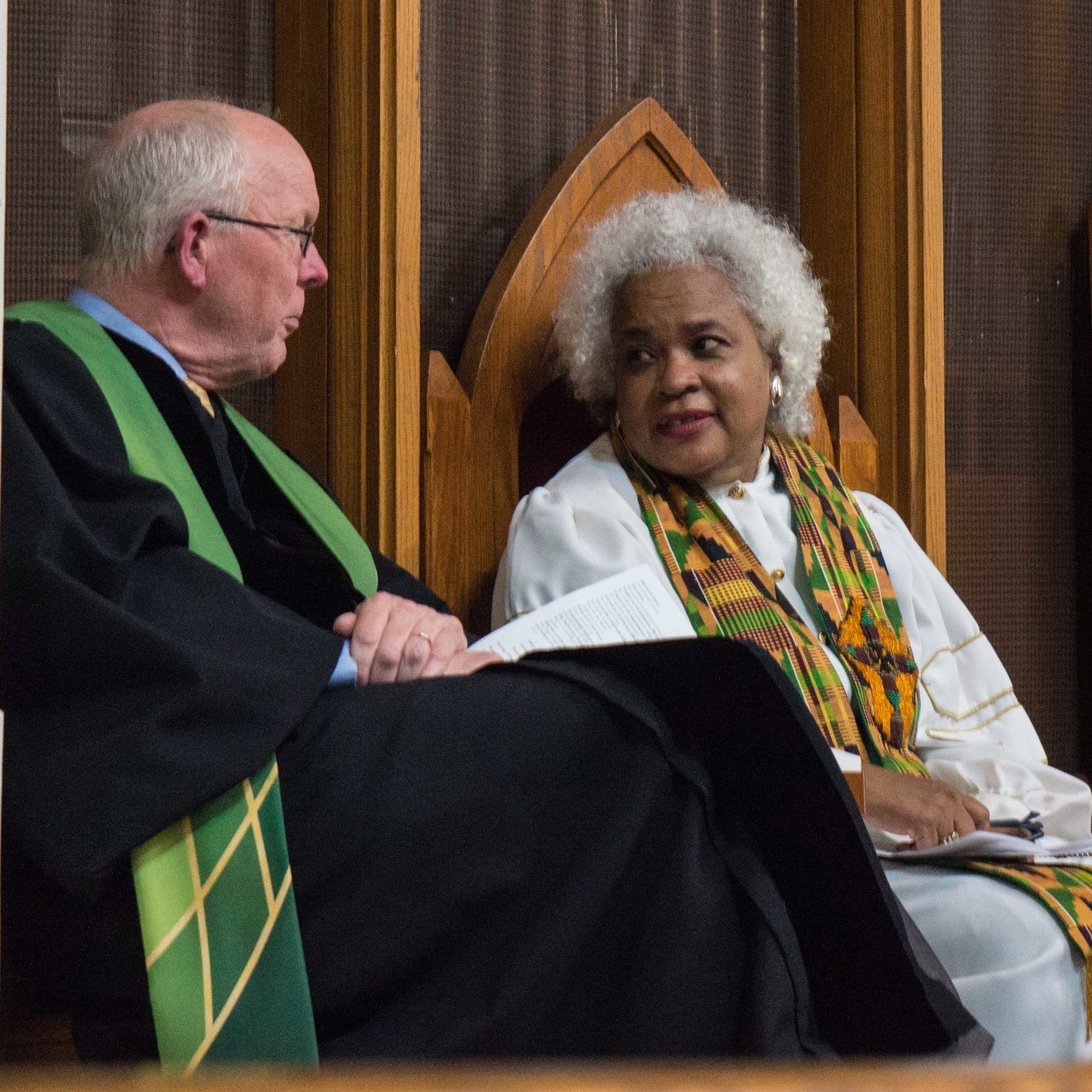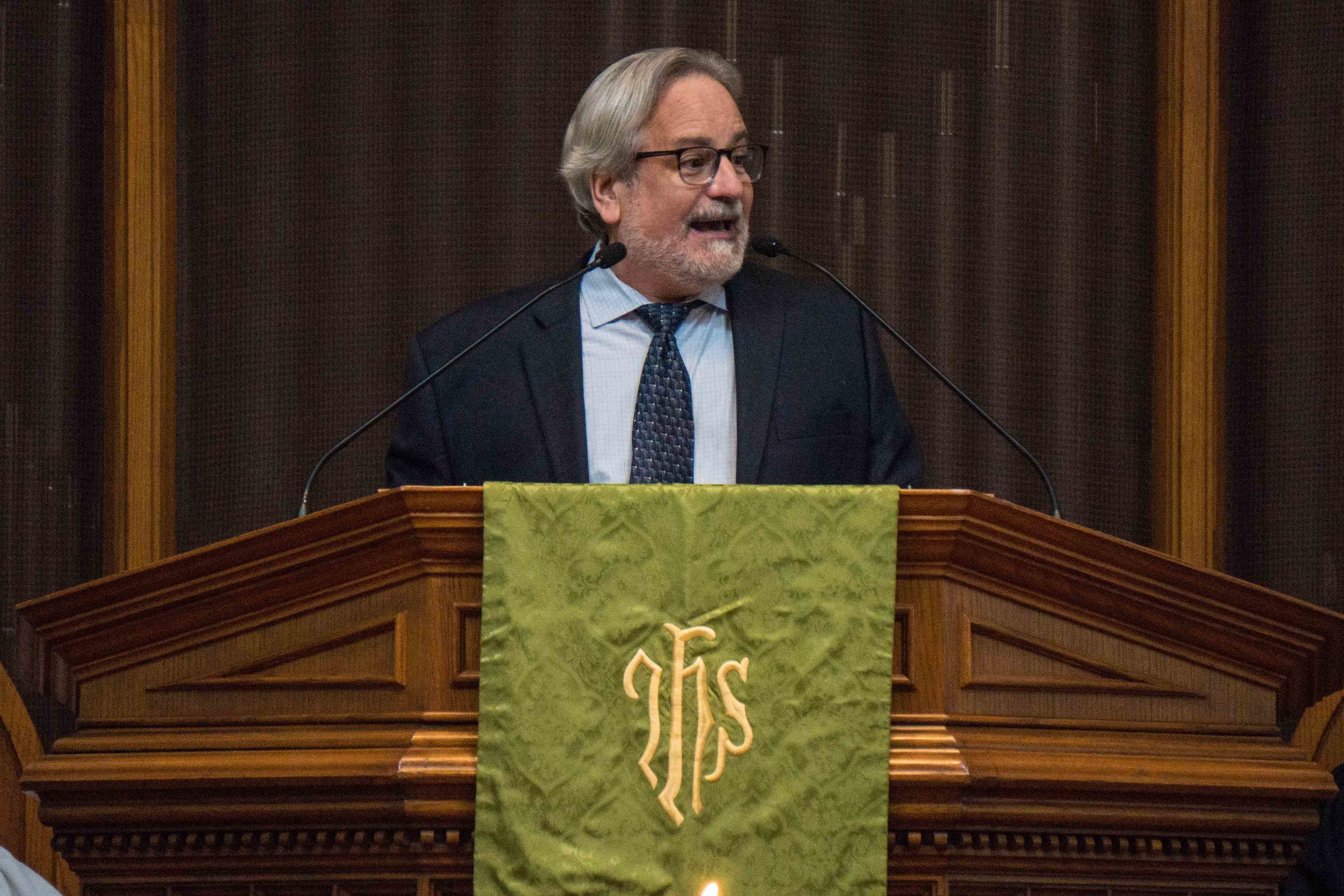Leaning Into Courage
by Harold Delhagen
Preface:
Two years ago, the Synod of the Northeast partnered with two very different congregations in a project we called “Undoing Racism.” The original partners were the Rendall Memorial Presbyterian Church, an historic a African American congregation in Harlem, New York, and First Presbyterian Church in Morristown, NJ, an historic, majority white congregation. Recently this initiative has included the First Presbyterian Church in Rutherford, NJ as well.
These congregations have made deep and lasting covenants to learn, worship, and fellowship together in order to undo the bonds of racism. It was my privilege to share the Word with these saints last Sunday, June 3rd. Here is the sermon and a few photos of this beautiful event.
COURAGE: mental or moral strength to venture, persevere,
and withstand danger, fear, or difficulty
– Merriam-Webster
Joshua 1:1-9
“After the death of Moses the servant of the Lord, the Lord spoke to Joshua son of Nun, Moses’ assistant, saying, ‘My servant Moses is dead. Now proceed to cross the Jordan, you and all this people, into the land that I am giving to them, to the Israelites. Every place that the sole of your foot will tread upon I have given to you, as I promised to Moses. From the wilderness and the Lebanon as far as the great river, the river Euphrates, all the land of the Hittites, to the Great Sea in the west shall be your territory. No one shall be able to stand against you all the days of your life. As I was with Moses, so I will be with you; I will not fail you or forsake you. Be strong and courageous; for you shall put this people in possession of the land that I swore to their ancestors to give them. Only be strong and very courageous, being careful to act in accordance with all the law that my servant Moses commanded you; do not turn from it to the right hand or to the left, so that you may be successful wherever you go. This book of the law shall not depart out of your mouth; you shall meditate on it day and night, so that you may be careful to act in accordance with all that is written in it. For then you shall make your way prosperous, and then you shall be successful. I hereby command you: Be strong and courageous; do not be frightened or dismayed, for the Lord your God is with you wherever you go.’”
Sermon:
What to do with my hands? Would it be more dangerous to leave them in my pocket, letting the officers wonder if I had a gun? Or to take them out and risk appearing to pull out a weapon? I could imagine the officer’s statement after shooting or assaulting me: “I feared for my life.” I opted to very slowly pull out my hands and let them swing by my sides. Gloveless, they hurt from the cold. When I finally turned the next corner, the cops slowed and glanced my way but kept walking. I sighed in relief.
That was part of the opinion piece Steven W. Thrasher, a doctoral candidate in American Studies, wrote on April 21st of this year. He gave it the title: A Problem Starbucks Can’t Train Away. He had just left a movie theater in SoHo and as he describes:
While rounding a corner, I saw two sets of suspicious eyes tracking my movements. By the time I had crossed the street and reached the sidewalk, I was aware that two New York City police officers were now walking behind me.
Were they looking for someone, and did I match his description? Were they looking for me because someone had called to say I looked suspicious or threatening?
My heart thumped as I realized that in my rush to get to the warmth of my home, I had just jaywalked. That’s an infraction committed countless times every day, and it’s certainly not a priority for the police, I told myself. (I had not yet seen the video of two white police officers tasering and beating a black man whom they accused of jaywalking in Asheville, NC.) But neither is loitering, the crime so many white Americans have argued justified the arrest of the men in Starbucks.
Over a month later and I just can’t shake his story. “What to do with my hands in my pockets?” It’s the smallest of things. Most of us would hardly have noticed if our hands were in our coat pockets or not – it’s almost as subtle as breathing – something else a black man on a street in New York City cannot take for granted. I just can’t let it go – the thought that we have an environment throughout our country where such simple things have become dangerous.
I’m thinking about the courage that is needed every day by so many people in our time:
A young black man with his hands in his pockets.
A woman stepping into an elevator filled with a group of men she doesn’t know.
A father dropping his children off for school for the day.
A mother & father leading their children by the hand across borders seeking new life.
It all takes courage.
As defined by Webster:
mental or moral strength to venture, persevere, and withstand danger, fear, or difficulty.
It all takes moral strength to persevere.
Let me ask you – what in your life calls forth courage today? I’m gonna ask that you turn to your neighbor and – if you are comfortable – share for a minute or so something that requires courage for you today. If you’re not comfortable with that – well, talk about the weather or something for a minute.
Welcome back.
Would anyone be comfortable sharing your thoughts on what takes courage for you today?
If anything – it seems these are days that demand extraordinary courage. These are days that require extraordinary moral strength. These are days that require perseverance. These are days of terrible danger that lead to a deep fearfulness. We were in the midst of a powerful brokenness in our culture with unrestrained hate speech – disrespect for the very humanity of the other – the justification of individual rights to possess weapons unimagined by the writers of our constitution. We are in a season where we are overwhelmed by a daily barrage of stories of women who finally feel they can say #MeToo and we can all say enough. We live in a time when the confession that Black Lives Matter is met by a resurgence of Confederate flags waving, not just in the south, but even in my own neighborhood.
These are days when we need some of Joshua’s courage. These are days when we need his moral strength to persevere to the promised land. This time not a land in Palestine (Lord have mercy on that land as our disease spreads), but this time we are called to have the courage to persevere to the promised land of the Beloved Community.
So let’s lean into Joshua’s story for a dose of courage.
Moses has died – for some 40 years the people had been journeying – wandering – and sometimes looking backwards – but they had persevered until Moses could get himself propped up on his feeble legs and with cataract-blurred eyes squint and see the Promised Land.
The cloak of leadership was quite deliberately placed upon the strong shoulders of Joshua, along with a promise that – just as God had journeyed and guided and even carried the people through Moses – now the Lord would do the same for them through Joshua. In verse 3 of this chapter God says: “every place that the soles of your feet touch will be a part of the promised land.”
I think that might be a promise for us to hear today.
First, that we need to keep on walking – keep on persevering – we need to stay on that journey to the promised land – to that great dream God has in mind for us – to stay on the way to God’s great dream for all people to be woven into one Beloved Community. That’s the promised land Dr. King pointed us toward – and I believe it’s the promised destination that we must continue to hold out before us in these days. Our Synod has claimed this as our shared vision as Presbyterians in the Northeast. To keep our eyes looking forward to a day when humanity transcends hatred and violence. To a day when those voices and spirits who have been marginalized and kicked to the curb rise up to speak truth to the powers that hold reign so strongly in our day. To a “Promised Land” where we don’t all always agree, but we can listen long enough and love broadly enough to hear one another and respect one another. To walk together toward a “Promised Land” where no woman is afraid to step on an elevator, or no parent is afraid to bring their child into our country, or to send them off to school for the day. Where not one young black man has to think about whether to keep his hands in his pockets or not.
You know the land we are heading toward – it’s the one Jesus taught us about and shaped us for. And it’s our call to let the soles of our feet touch as much ground as possible, believing that wherever we set the soles of our feet, with this promise, becomes holy ground, leading to that promised place.
the Lord says to Joshua, and the Lord says to you and me: “No one shall be able to stand against you.”
Then the Lord says:
“Be strong and courageous; for you shall put this people in possession of the land that I swore to their ancestors to give them. Only be strong and very courageous…”
Many of you here know better than I do the kind of courage that will take. And you also know the kind of courage needed will not be the same for all of us.
For some – it’s the courage to face the threats of deep-seated racism each and every day. I can’t even begin to imagine the courage that calls for. Nor can I speak to the exhaustion that perseverance through this must produce.
I do know that there has been a whole lot of courage manifested by the partnership between these two congregations – or as we prefer to call them: Gospel Communities. I know it has taken some real Joshua-like courage for your pastors to even initiate this sacred experiment.
I know it’s taken some real courage for you all to cross that border that divides the most segregated hour of the week.
I know that it’s taken some real courage for the black folk from Rendall, in this sacred experiment, to trust their stories into the hearts of the white folk from Morristown. I know it’s taken some deep courage for the white folk to look into the terrible roots of our white privilege. You see, it’s no longer just black or brown folk who now must live with everyday reminders. Part of dismantling our white supremacy means that those of us who have lived taking our white privilege for granted must never retreat back into the luxury of complacency.
Together we need to be committed that wherever the soles of our feet touch the ground – we are challenging the structural powers of racism, the structural powers of hate, the structural powers of violence. Just as in the story of Joshua – once on our way toward the Promised Land – there is no turning back.
I have called what you are doing a sacred experiment – but it’s not just that – this is a sign of the first fruits of the Beloved Community. This is a journey that requires us to trust in God’s preferred future – it’s a journey that will bear witness that those of us who are committed to following Jesus.
As the Belhar Confession declares:
Christ's work of reconciliation is made manifest in the church as the community of believers who have been reconciled with God and with one another;
-- That unity is, therefore, both a gift and an obligation for the church of Jesus Christ;
-- That this unity must become visible so that the world may believe that separation, enmity, and hatred between people and groups is sin, which Christ has already conquered, and that anything which threatens this unity may have no place in the Church and must be resisted.
I want to thank you for your courage. May the soles of your feet cover much ground and continue to liberate our world from the grip of fear to the promise of God’s Beloved Community.
-- Harold M. Delhagen
















































